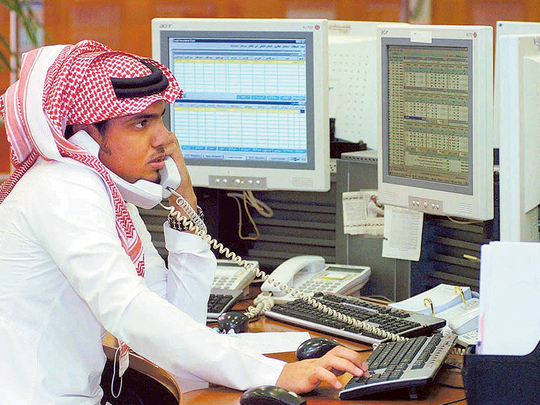
Riyadh: Saudi Arabia’s stock market may benefit from funds seeking refuge from a land tax as share sales accelerate, the country’s bourse chief said.
The government’s plan to charge fees for undeveloped land may “trigger a flight of capital from real estate into the capital market,” chief executive officer of the Saudi Stock Exchange Tadawul Adel Al Ghamdi said in an emailed response to questions Tuesday. “We witnessed the beginnings of this only last week with $2.2 billion of prime real estate being sold off over two consecutive days.”
One of the King Salman’s first policy decisions after taking power in January was to approve a tax on millions of acres of so-called white land: development plots in cities that lie empty for years because the owners have no incentive to build on them, the official Saudi Press Agency reported March 23. About 40 per cent of the land in the capital, Riyadh, sits vacant, the Saudi Housing Ministry estimated in 2013.
The kingdom’s stock market is preparing to receive its first direct foreign investment in equities next month, part of a plan by OPEC’s biggest crude exporter to diversify its economy away from oil. The Riyadh-based Capital Market Authority finalised rules on Monday, paving the way for inclusion in MSCI Inc.’s Emerging Markets Index as early as 2017. Income from oil accounted for almost 90 per cent of revenue last year.
Investors from outside the six-nation Gulf Cooperation Council currently gain entry into shares listed on the $571 billion market through equity swaps and exchange-traded funds.
IPOs
The number of initial public offerings are likely to increase compared to the previous four years, Al Ghamdi said. Seventeen companies have sold stakes for the first time on the Saudi exchange in since the start of May 2011, according to data compiled by Bloomberg.
“There’s certainly a great deal of available demand to absorb all upcoming IPOs,” he added, referring to an oversubscription of the shares of National Commercial Bank which raised $6 billion in the Middle East’s biggest offering.
Rules that allow foreign institutional investors direct market participation are a progression of “liberalisation efforts” aimed at complying with international standards, he said.
A classification into emerging market indexes “will likely encourage further foreign portfolio fund flows into the stock market,” Al-Ghamdi said. That will help “the qualitative influences we expect foreign investors to bring to our market in terms of sophisticated investment behaviour, and shareholder activism,” he said.
The earliest date that Saudi Arabia could be included in the MSCI’s EM index is June 2017, Robert Ansari, executive director and head of client coverage team at MSCI in the Middle East, said in Riyadh yesterday.
Cross-Listing
Tadawul officials are also working on regulations to allow non-Saudi companies to cross list on the exchange, the bourse chief said. A dual-listing agreement between neighbouring United Arab Emirates and Egypt has already been used by Dubai-based Orascom Construction Ltd. for offerings in both countries.
The benchmark Tadawul All share Index is up 17 per cent this year, making it the best performer in the Middle East. The gains have pushed stock prices to almost 17 times projected 2015 earnings, compared with 13 times for MSCI’s EM Index.












